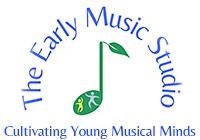FAQ
How many classes are in a semester? 13 weeks
How long is a class? All of our classes are a fast paced 45 minutes long.
What does a typical class look like?
Welcome song
Rhythm and tonal patterns - echoing
Fingerplays, poetry
Expressive movement (use of props such as scarves or hoops)
Focused listening activity (to help develop auditory acuity)
Story adventure (acting out a story idea)
Rhythm practice (rhythm sticks, bells, shakers)
Closing song
Can I start mid-semester?
Absolutely, we will prorate classes when families join after the semester has started.
Can I try a class?
Yes. You are welcome to come and try your first class for free.
How many students are in each class?
We take a maximum of 10 students
Why should I pursue early childhood music education for my child?
Music awakens and stimulates neural pathways in the brain that are associated with higher forms of intelligence, such as abstract thinking, empathy, mathematics and science. Music's melodic and rhythmic patterns provide exercise for the brain and help develop memory. Remember singing the ABC song to learn your ABC's? Studying music helps children establish good listening habits, which are essential for achievement in school. Overall, music activities are perfect for child development. Music immerses the child in language, evokes movement, stimulates the brain and fosters physical coordination - all in a group setting that builds community - a holistic experience.
What does it mean when you say Musikgarten has a 9 year developmental plan for my child?
Only Musikgarten has a program that addresses the unique developmental needs of children at each age. Each of the classes are interrelated, as they were written for children to grow-up with Musikgarten. This sequential planning also makes it easier for the students to grow in their musical competence and graduate to instrument playing.
Can Parents attend and participate in the classes?
Yes. For our classes held at The Leedy Grange, classes are designed for the child to attend and take part with their grownup.
Parents are an integral part of class in the younger years. As students get older they participate by themselves, but parents take part in the classes towards the end of each lesson.
How are our classes different from other group music classes?
Musikgarten lays the foundations for later formal instrumental learning. Our classes are very intentional in everything we teach - from the tonal patterns we use in thanking the children for returning their instruments to the focused listening activities where we isolate our hearing sense to better develop auditory acuity.
Does Musikgarten today better prepare students for piano lessons?
Yes, in most cases. Musikgarten classes develop students' aural senses more than other pre-piano methods. The Music Makers: At the Keyboard classes are taught in a group session, so that children learn from each other and grow in their comfort of playing with and in front of one another.
Why do the students get Home Materials? Are we supposed to practice at home?
Children and parents can have so much fun at home and in the car with Musikgarten songs and dances. In class you learn the songs, but at home is where you really have fun with the songs and dances. It's a great family bonding time. Parents are asked to include active music making in their child’s life. Sing along with the songs, play echo games, making up patterns, as we do in class. Put the picture cards or notation games on your refrigerator and play identification games with them as you get ready for dinner. More structured practice is required when the children get to Music Makers: At the Keyboard.
I have an older child and their school is closed. Can I bring him/her to music class?
Yes! We welcome older siblings- please let us know so that we may provide enough materials.
As my child gets older there seem to be more and more activities for him/her to do? Why should I continue with music and movement training?
After being in the program for a while, you can see the benefits your child is getting from class. It is our view that the singing, dancing and playing (in class and at home) is the best for your child's holistic development: language, movement, math skills, and physical coordination - all in a group setting that builds community. While other activities can be fun too, the primary building block to support all areas of learning can come from Musikgarten.

